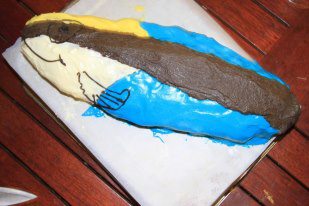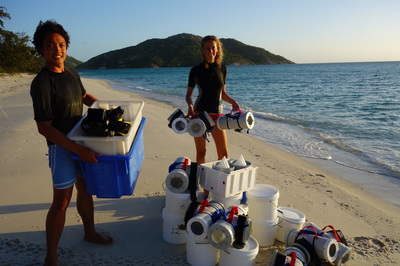Dr. Derek Sun

Position: Post Doc/Lab Manager
Education:
Research Interests: Coral reef ecology, Cleaning symbiosis, fish behaviour, marine parasitology, gnathiids, coral reef fish larvae and otoliths.
Awards & Grants:
Research Interest: I completed my honours in 2009 under the supervision of Dr Lexa Grutter and Associate Professor Thomas Cribb where I examined the parasite load and relationship on growth in the young damselfish, Pomacentrus amboinensis. I then commenced my PhD in 2010 under the supervision of Dr Lexa Grutter, Associate Professor Thomas Cribb and Dr Karen Cheney.
Honours Research Project: "The effects of parasites on the early life stages of a damselfish"
I examined the relationship between parasites and growth in the early life history stages of a damselfish (Pomacentrus amboinensis ). Many studies have shown that early life history traits, such as larval growth, influences the success of coral reef fish in the transition from the larval to the juvenile life phase. However, very little is known about the role of parasites during this critical stage. I found that larval fish had a parasite prevalence of 97% before decreasing to 60% in recently-settled fish. Daily fish growth, determined from otolith increments, revealed that growth did not differ between parasitised and non-parasitised larval fish, whereas recently settled fish that were parasitised had faster growth. This study suggest that parasites may explain some of the variation in growth and survival observed among coral reef fishes after settlement and thereby have a greater impact on population dynamics than previously understood.
Supervisors: Dr Lexa Grutter and Associate Prof Thomas Cribb.
PhD Project: “Parasites and cleaning behaviour in damselfish”
Damselfishes are one of the most common and diverse group of marine fishes found on coral reefs. However, their digenean fauna and cleaning interactions with the bluestreak cleaner wrasse, Labroides dimidiatus, are poorly studied. My PhD thesis explores the digenean trematode fauna in damselfishes and examines several aspects of the role of L. dimidiatus in the recruitment of young damselfishes. The work has contributed insight into both host range and species richness, having uncovered both novel hosts and trematode species. As well as demonstrating the importance of L. dimidiatus not only for adult fishes, but for young damselfishes during the recruitment period. This PhD will help increase our understanding of marine settlement processes on coral reefs and allow us to better manage coral reef ecosystems, particularly the Great Barrier Reef, a World Heritage site and region of great biodiversity and economic importance.
Supervisors: Dr Lexa Grutter, Associate Prof Thomas Cribb and Dr Karen Cheney.
http://seaworld.com.au/research-and-rescue/marine-animal-research/fish/cleaner-fish-on-the-great-barrier-reef.aspx
Publications:
Binning, S. A., Roche, D. G., Grutter, A. S., Colosio, S., Sun, D., Miest, J., Bshary, R. (2018) Cleaner wrasse indirectly affect the cognitive performance of a damselfish through ectoparasite removal. Proceeding of the Royal Society B DOI: 10.1098/rspb.2017.2447
Grutter, A. S., De Brauwer, M., Cheney, K. L., Cribb, T. H., Madin, E. M. P., McClure, E. C., Meekan, M. G., Sun, D., Warner, R. R., Werminghausen, J., Sikkel, P. C. (2018). Parasite infestation increases on coral reefs without cleaner fish. Coral Reefs 37(1), 15-24.
Sun D., Cheney, K. L., Werminghausen, J., McClure, E. C., Meekan, M. G., McCormick, M. I., Cribb, T. H., Grutter, A. S. (2016) Cleaner wrasse influence habitat selection of young damselfish. Coral Reefs 29:1-0.
Sun, D., Cheney, K. L., Werminghausen, J., Meekan, M. G., McCormick, M. I., Cribb, T. H., Grutter, A. S. (2015). Presence of cleaner wrasse increases the recruitment of damselfishes to coral reefs. Biology Letters 11 20150456; DOI: 10.1098/rsbl.2015.0456
Sun, D., Bray, R. A., Yong, R. Q. Y., Cutmore, S. C., & Cribb, T. H. (2014). Pseudobacciger cheneyae n. sp.(Digenea: Gymnophalloidea) from Weber’s chromis (Chromis weberi Fowler & Bean)(Perciformes: Pomacentridae) at Lizard Island, Great Barrier Reef, Australia. Systematic Parasitology 88(2), 141-152
Sun, D., Blomberg, S., Cribb, T., McCormick, M., & Grutter, A. (2012) The effects of parasites on the early life stages of a damselfish. Coral Reefs 31: 1065-1075.
Media Release:
Education:
- 2006 – 2009 Bachelor of Marine Studies, The University of Queensland
- 2009 Honours, “The Effects of Parasites on the Early Life Stages of a Damselfish” Supervisors: Dr Lexa Grutter and Associate Professor Thomas Cribb
Research Interests: Coral reef ecology, Cleaning symbiosis, fish behaviour, marine parasitology, gnathiids, coral reef fish larvae and otoliths.
Awards & Grants:
- 2014 International Society for Behavioral Ecology (ISBE) travel award
- 2012-2014 Sea World Research and Rescue Foundation Inc Grant, Australia (SWRRFI)
- 2010 UQ Establishment Grant
- 2010 Australian Postgraduate Award (APA)
Research Interest: I completed my honours in 2009 under the supervision of Dr Lexa Grutter and Associate Professor Thomas Cribb where I examined the parasite load and relationship on growth in the young damselfish, Pomacentrus amboinensis. I then commenced my PhD in 2010 under the supervision of Dr Lexa Grutter, Associate Professor Thomas Cribb and Dr Karen Cheney.
Honours Research Project: "The effects of parasites on the early life stages of a damselfish"
I examined the relationship between parasites and growth in the early life history stages of a damselfish (Pomacentrus amboinensis ). Many studies have shown that early life history traits, such as larval growth, influences the success of coral reef fish in the transition from the larval to the juvenile life phase. However, very little is known about the role of parasites during this critical stage. I found that larval fish had a parasite prevalence of 97% before decreasing to 60% in recently-settled fish. Daily fish growth, determined from otolith increments, revealed that growth did not differ between parasitised and non-parasitised larval fish, whereas recently settled fish that were parasitised had faster growth. This study suggest that parasites may explain some of the variation in growth and survival observed among coral reef fishes after settlement and thereby have a greater impact on population dynamics than previously understood.
Supervisors: Dr Lexa Grutter and Associate Prof Thomas Cribb.
PhD Project: “Parasites and cleaning behaviour in damselfish”
Damselfishes are one of the most common and diverse group of marine fishes found on coral reefs. However, their digenean fauna and cleaning interactions with the bluestreak cleaner wrasse, Labroides dimidiatus, are poorly studied. My PhD thesis explores the digenean trematode fauna in damselfishes and examines several aspects of the role of L. dimidiatus in the recruitment of young damselfishes. The work has contributed insight into both host range and species richness, having uncovered both novel hosts and trematode species. As well as demonstrating the importance of L. dimidiatus not only for adult fishes, but for young damselfishes during the recruitment period. This PhD will help increase our understanding of marine settlement processes on coral reefs and allow us to better manage coral reef ecosystems, particularly the Great Barrier Reef, a World Heritage site and region of great biodiversity and economic importance.
Supervisors: Dr Lexa Grutter, Associate Prof Thomas Cribb and Dr Karen Cheney.
http://seaworld.com.au/research-and-rescue/marine-animal-research/fish/cleaner-fish-on-the-great-barrier-reef.aspx
Publications:
Binning, S. A., Roche, D. G., Grutter, A. S., Colosio, S., Sun, D., Miest, J., Bshary, R. (2018) Cleaner wrasse indirectly affect the cognitive performance of a damselfish through ectoparasite removal. Proceeding of the Royal Society B DOI: 10.1098/rspb.2017.2447
Grutter, A. S., De Brauwer, M., Cheney, K. L., Cribb, T. H., Madin, E. M. P., McClure, E. C., Meekan, M. G., Sun, D., Warner, R. R., Werminghausen, J., Sikkel, P. C. (2018). Parasite infestation increases on coral reefs without cleaner fish. Coral Reefs 37(1), 15-24.
Sun D., Cheney, K. L., Werminghausen, J., McClure, E. C., Meekan, M. G., McCormick, M. I., Cribb, T. H., Grutter, A. S. (2016) Cleaner wrasse influence habitat selection of young damselfish. Coral Reefs 29:1-0.
Sun, D., Cheney, K. L., Werminghausen, J., Meekan, M. G., McCormick, M. I., Cribb, T. H., Grutter, A. S. (2015). Presence of cleaner wrasse increases the recruitment of damselfishes to coral reefs. Biology Letters 11 20150456; DOI: 10.1098/rsbl.2015.0456
Sun, D., Bray, R. A., Yong, R. Q. Y., Cutmore, S. C., & Cribb, T. H. (2014). Pseudobacciger cheneyae n. sp.(Digenea: Gymnophalloidea) from Weber’s chromis (Chromis weberi Fowler & Bean)(Perciformes: Pomacentridae) at Lizard Island, Great Barrier Reef, Australia. Systematic Parasitology 88(2), 141-152
Sun, D., Blomberg, S., Cribb, T., McCormick, M., & Grutter, A. (2012) The effects of parasites on the early life stages of a damselfish. Coral Reefs 31: 1065-1075.
Media Release:
- News Article: IFLScience. "Cleaner fish makes other reef fish smarter", by Stephen Luntz. March 16 2018. http://www.iflscience.com/plants-and-animals/cleaner-fish-may-make-other-fish-in-the-sea-smarter/
- News Article: UQ News. 'Clean body, clean mind - Parasite-pickers promote learning potential' https://shorthand.uq.edu.au/news/clean-body-clean-mind/
- News Article: Oceanbites. Org, “Better together: Mutualisms contribute to reef fish recruitment”, by Rebecca Flynn. http://oceanbites.org/mutualisms-reef-fish-recruitment/. October 27th 2015.
- News Article: IFLScience. 'Coral reefs need cleaning too', by Stephen Luntz. September 2 2015. http://www.iflscience.com/plants-and-animals/coral-reefs-need-cleaning-too/
- News Article: Fish Channel, “Cleaner wrasse on reefs increase presence of juvenile damselfish”, by John B Virata. http://www.fishchannel.com/fish-news/2015/08/cleaner-wrasse-on-reefs-increase-presence-of-juvenile-damselfish-trending.aspx. September 10th 2015.
- News Article: UQ News. 'Fishy business: Cleaners with happy clients'. August 19 2015. https://www.uq.edu.au/news/article/2015/08/fishy-business-cleaners-happy-clients
- News Article: Physorg.com. 'Presence of bluestreak cleaner wrasse increases the number of juvenile fish on reefs'. August 19 2015. http://phys.org/news/2015-08-presence-bluestreak-cleaner-wrasse-juvenile.html
- News Article: ABC Science. 'Reef fish like a home with a cleaner', by Anna Salleh. August 19 2015. http://www.abc.net.au/science/articles/2015/08/19/4295627.htm?topic=enviro
Contact details:
School of Biological Sciences
Goddard Building (8), Room 113
The University of Queensland
St Lucia, QLD 4072
Australia
Email: derek.sun@uqconnect.edu.au
Phone: +61 (7) 3365 1398
Mob: +61 (0) 423 934 532


